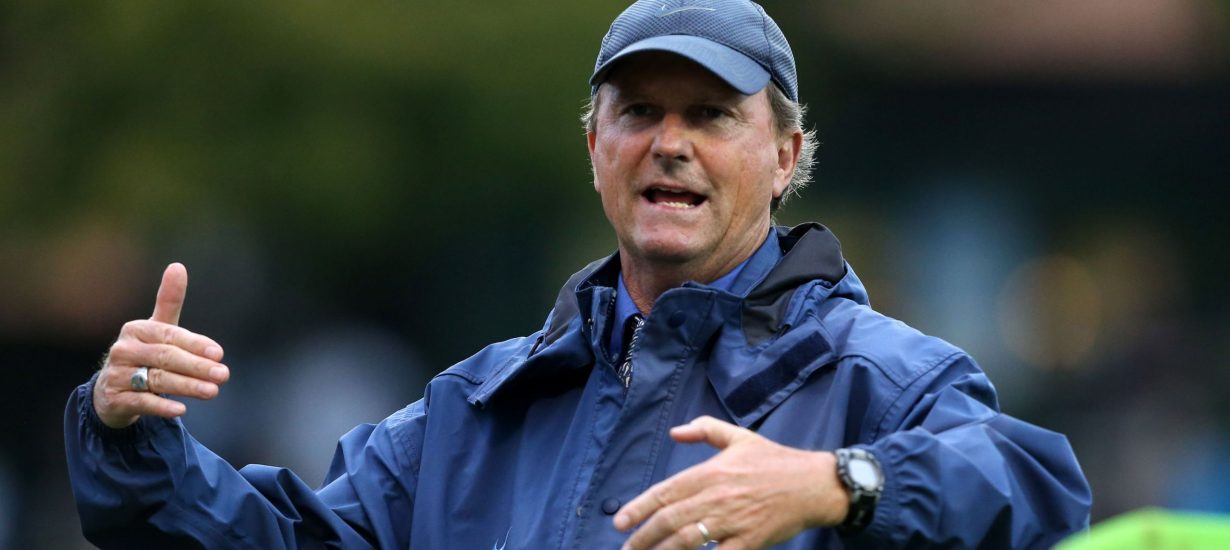Dorrance, in Seniors’ Last Lecture, Talks About How Teams Are Built

Anson Dorrance ’74 performs the same ritual before each national championship game his women’s soccer team plays — and that’s 24, with 22 ending in victory. It doesn’t have anything to do with superstition. It’s all about appreciation.
“I spend the entire day and half the night before the national championship game writing a note to every senior on my roster, thanking each of them for the incredible human contribution they’ve made to my team,” Dorrance told seniors attending Carolina’s annual Last Lecture on April 20.
The next morning, Dorrance delivers the letters, often “bleary eyed and honestly half asleep.”
“Rest assured the letters are more powerful and valuable to my team than me actually being awake during the game,” he said.
Dorrance uses the letters not only to let his senior players know how important they are to the team, he also shares copies with the rest of the team so that they remember the special women they are playing for.
“What we are consciously trying to do is to construct real connections where our players, emotionally, play for each other,” he explained. “And this stuff works.”
Dorrance was selected by the class of 2017 to deliver the Last Lecture on the west lawn of the Morehead Building as the sun began to set. The talk is based on the premise, “If you knew this was the last lecture you would ever give, what would you say?”
The concept behind the Last Lecture has been around at Carolina and other institutions for many years, often involving veteran professors. At Carolina, it is now part of Senior Week, and the UNC General Alumni Association — as an official adviser of the senior class each year — assists in a number of Senior Week activities, including the Last Lecture. The Last Lecture tradition received national attention in 2007, when a computer science professor at Carnegie Mellon University — Randy Pausch, who at 46 was dying from pancreatic cancer — delivered a notably moving, upbeat message. His remarks were watched and heard by millions online.
In his talk, Dorrance focused on the importance of building character at college and throughout life. “I’d like to challenge you to choose character, to build your own resilience, your own positivity, your own capacity to be loyal, to care, connect and love.”
He shared some of the 12 core value quotations that he asks his players to memorize “to help them navigate what I hope will be principle-centered lives.”
The best championship teams play for one another, and sometimes the team unites in an even higher goal — to play for a special person who is facing a tough challenge.
In 2006, that person was Kelly Muldoon, a 12-year-old cancer patient from Florida, who met the women’s soccer team when she was in North Carolina for treatment.
The Tar Heels wore the initials “K.M.” on their wristbands all season and made Kelly an honorary member of the team. Kelly and her parents sat behind the Tar Heel bench when the team won the NCAA championship over Notre Dame.
Now the team gives the Kelly Muldoon Award to its most courageous member.
But the championship that means the most to Dorrance is the one in 2012. For that Final Four, his wife, former ballet dancer and dance teacher M’Liss Dorrance, had been diagnosed with an autoimmune disease and could not travel to the tournament. “In a gesture I will never forget, the team got together and decided to play for her,” he recalled.
His wife and their son, Donovan Dorrance ’13, sat near the front of the Last Lecture audience.
“I have many championship rings, but this is the only one I will wear,” Dorrance said, a slight break in his voice. “In 2012, the team played for the most important person in my life. I will wear this ring until I die.”
